- All the latest news, data, and market intelligence across MENA at your fingerprints
- First-hand updates and inside information on projects, clients and competitors that matter to you
- 20 years' archive of information, data, and news for you to access at your convenience
- Strategize to succeed and minimise risks with timely analysis of current and future market trends
Latest News
-
 Indian firm wins major Oman substation contract
Indian firm wins major Oman substation contract12 February 2026

India’s Larsen & Toubro has won a contract to build the Majan 400/220/132kV grid station in Oman.
Estimated to cost $100m, the project includes an associated 400kV line-in line-out underground cable from Sohar Free Zone to the Sohar Interconnector Station.
The contract was awarded by Oman Electricity Transmission Company (OETC), part of the government-owned Nama Group.
The grid station will comprise eight 400kV gas-insulated switchgear (GIS) bays, eight 220kV GIS bays and 10 132kV GIS bays at the new Sohar Free Zone substation.
The scope includes the installation of two 500MVA, 400/220kV transformers and two 500MVA, 220/132kV transformers.
Local firm Monenco Consulting Engineers was appointed in April last year to provide design and supervision services for the project.
As MEED exclusively revealed, the main contract was tendered in June, as part of three significant contracts to build new substations in the sultanate.
The second contract, worth about $35m, covers the construction of the Sultan Haitham City 132/33kV grid station and associated 132kV line-in line-out underground cables running 4 kilometres from Mabella to Mabella Industrial Zone.
The third contract, valued at about $100m, covers the construction of the Surab 400/33kV grid station and an associated 400kV line-in line-out cable from the Duqm grid station to the Mahout grid station.
Local firms Muscat Engineering Consulting and Hamed Engineering Services are consultants for the Sultan Haitham City and Surab projects, respectively.
The two remaining contracts are currently under bid evaluation, with awards expected this quarter.
https://image.digitalinsightresearch.in/uploads/NewsArticle/15638107/main.jpg -
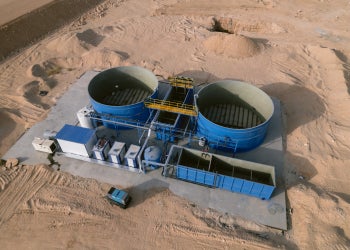 Developers appoint contractor for $500m wastewater treatment project
Developers appoint contractor for $500m wastewater treatment project12 February 2026

Register for MEED’s 14-day trial access
Egypt’s Orascom Construction has won the engineering, procurement and construction (EPC) contract for a major wastewater treatment project in Saudi Arabia’s Eastern Province.
A consortium of Saudi utilities provider Marafiq, the regional business of France’s Veolia and Bahrain/Saudi Arabia-based Lamar Holding is developing the $500m (SR1.875bn) industrial wastewater treatment plant (IWWTP) in Jubail Industrial City 2.
Sources close to the project confirmed the appointment to MEED, adding that the project has now entered the construction phase.
Industry sources also said that financial close on the project is expected to be reached in the coming days.
In September, the developer consortium was awarded a contract, under a 30-year concession agreement, by Saudi Aramco Total Refining & Petrochemical Company (Satorp), a joint venture of Saudi Aramco and France’s TotalEnergies.
The planned facility will treat and recycle wastewater from Satorp’s under-construction Amiral chemical derivatives complex, also in Jubail.
Marafiq, formally Power & Water Utility Company for Jubail and Yanbu, will own a 40% stake in the dedicated project company. Veolia Middle East SAS will hold a 35% stake, and Lamar Holding’s Lamar Arabia for Energy will hold the other 25%.
The planned IWWTP, which will primarily serve the $11bn sprawling Amiral chemicals zone, will implement advanced water treatment and recovery technologies to process complex industrial effluents, including spent caustic streams. Treated water will be reintegrated into the industrial processes, supporting closed-loop reuse and energy efficiency.
The project follows a concession-style model, akin to a public-private partnership (PPP), where the developer consortium invests in, builds and operates the wastewater plant over a 30-year period, with returns linked to service delivery.
Marafiq has been involved in several similar projects across Saudi Arabia, including as the sole owner of the Jubail industrial water treatment plant (IWTP8), which treats complex industrial effluents for petrochemical and heavy industrial companies.
In 2020, Saudi Services for Electro Mechanic Works was awarded the $202m main contract for the fourth expansion phase of IWTP8. Construction works on the project are expected to be completed by the end of the quarter.
 READ THE FEBRUARY 2026 MEED BUSINESS REVIEW – click here to view PDF
READ THE FEBRUARY 2026 MEED BUSINESS REVIEW – click here to view PDFSpending on oil and gas production surges; Doha’s efforts support extraordinary growth in 2026; Water sector regains momentum in 2025.
Distributed to senior decision-makers in the region and around the world, the February 2026 edition of MEED Business Review includes:
> AGENDA: Mena upstream spending set to soar> INDUSTRY REPORT: MEED's GCC water developer ranking> INDUSTRY REPORT: Pipeline boom lifts Mena water awards> MARKET FOCUS: Qatar’s strategy falls into place> CURRENT AFFAIRS: Iran protests elevate regional uncertainty> CONTRACT AWARDS: Contract awards decline in 2025> LEADERSHIP: Tomorrow’s communities must heal us, not just house us> INTERVIEW: AtkinsRealis on building faster> LEADERSHIP: Energy security starts with rethinking wasteTo see previous issues of MEED Business Review, please click herehttps://image.digitalinsightresearch.in/uploads/NewsArticle/15637523/main.jpg -
 Dewa raises Empower stake in $1.41bn deal
Dewa raises Empower stake in $1.41bn deal12 February 2026
Dubai Electricity & Water Authority (Dewa) has announced it has increased its stake in Emirates Central Cooling Systems Corporation (Empower) from 56% to 80%.
The transaction was completed through the purchase of 2.4 billion shares and the transfer of the entire ownership of Emirates Power Investment (EPI), which is wholly owned by Dubai Holding.
The total value of the deal is AED5.184bn ($1.41bn).
Empower currently holds over 80% of Dubai’s district cooling market and operates 88 district cooling plants across the emirate.
According to MEED Projects, the UAE’s district cooling sector currently has nine projects worth $1.29bn in the pre-execution phase.
Empower has ownership in four of these projects, which have a combined value of $472m.
This includes a $200 million district cooling plant at Dubai Science Park, with a total capacity of 47,000 refrigeration tonnes serving 80 buildings.
Empower signed a contract to design the plant last August, with construction scheduled to begin by the end of the first quarter of 2026.
The utility is also building a district cooling plant at Dubai Internet City.
UAE-based TMF Euro Foundations was recently appointed as the enabling and piling subcontractor for the project.
https://image.digitalinsightresearch.in/uploads/NewsArticle/15635949/main.jpg -
 Saudi cabinet approves Qatar high-speed rail link
Saudi cabinet approves Qatar high-speed rail link12 February 2026
Saudi Arabia has approved the establishment of a proposed high-speed rail line connecting Riyadh and Doha.
The approval was granted during a cabinet session chaired by King Salman Bin Abdulaziz Al-Saud in Riyadh on 10 February.
The high-speed railway line will cover 785 kilometres (km) and will pass through Hofuf and Dammam, while also linking King Salman International airport and Hamad International airport.
Saudi Arabia and Qatar signed an agreement in December last year to build a high-speed rail line.
The agreement was inked by Saudi Arabia’s Transport & Logistics Services Minister, Saleh Al-Jasser, and Qatar’s Transport Minister, Sheikh Mohammed Bin Abdulla Bin Mohammed Al-Thani.
Trains will reach speeds exceeding 300 kilometres an hour, reducing the travel time between the two capitals to about two hours.
The project is slated for completion in six years. It is expected to serve over 10 million passengers annually and create more than 30,000 direct and indirect jobs.
Riyadh and Doha relaunched the proposed rail link between the two countries in 2022, after agreeing to set a date to begin studying the connection.
In July of that year, France’s Systra was selected to conduct a feasibility study on the proposed scheme, as MEED reported.
A rail link connecting Saudi Arabia and Qatar was planned before the diplomatic dispute that froze relations between Riyadh and Doha from 2017 until the Al-Ula Declaration was signed in January 2021.
In 2016, Qatar Railways Company (Qatar Rail) planned to tender a design-and-build contract for the construction of regional railways in Qatar, including a link to the Saudi border.
https://image.digitalinsightresearch.in/uploads/NewsArticle/15635582/main.jpg -
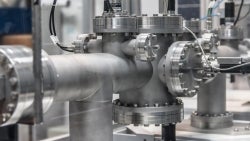 Bidders line up for Saudi sewage treatment contract
Bidders line up for Saudi sewage treatment contract12 February 2026

Six bidders are competing in the next phase of Saudi Arabia’s long-term operations and maintenance (LTOM) sewage treatment programme, as National Water Company (NWC) moves closer to awarding a contract.
The contract covers the North Western A Cluster Sewage Treatment Plants Package 11 (LTOM11) and has an estimated value of about $211m.
The project involves the construction and upgrade of two sewage treatment plants with a combined capacity of about 440,000 cubic metres a day (cm/d).
As MEED understands, the companies that have submitted proposals include:
- Alkhorayef Water & Power Technologies (Saudi Arabia)
- Civil Works Company (Saudi Arabia)
- United Water (China)
- Kuzu Group (Turkey)
- VA Tech Wabag (India)
- Aguas de Valencia (Spain)
LTOM11, also known as the North Western A Cluster, forms part of the second phase of NWC’s rehabilitation of sewage treatment plants programme.
The scheme is being procured on an engineering, procurement and construction (EPC) basis with a long-term operations component.
The scope also includes a pumping station, surplus discharge lines, SCADA installation and associated infrastructure.
The main contract was tendered last year, with an award initially expected by the end of 2025.
It is now understood that NWC is preparing to offer the main contract in this quarter.
LTOM programme
LTOM11 follows a series of earlier awards under the programme.
In January, a consortium of United Water (China), Prosus Energy (UAE) and Armada Holding (Saudi Arabia) won the main contract for the Northern Cluster Sewage Treatment Plants Package 10 (LTOM10).
This has an estimated value of about SR203m ($54.1m).
NWC previously awarded $2.7bn-worth of contracts for the first phase of its LTOM programme. This comprises nine packages covering the treatment of 4.6 million cm/d of sewage water for the next 15 years.
As MEED reported, local contracting firm Alkhorayef Water & Power Technologies won three contracts with a combined capacity of 2.04 million cm/d, nearly half of the awarded total. These three contracts are worth more than SR5.53bn ($1.47bn).
A consortium of France’s Suez and the local Al-Awael Modern Contracting Group, with its affiliate Civil Works Company (CWC), won two packages worth a combined SR1.84bn.
A consortium comprising France’s Veolia and Awael-CWC won a single package worth SR1.26bn, and local utility developer Miahona won one package worth SR392m.
In 2024, a joint venture of CWC and Al-Awael Modern Contracting was awarded a $211m contract for LTOM9.
As part of the second phase, the main contract bids for LTOM12 (North Western B Cluster) have also been submitted.
https://image.digitalinsightresearch.in/uploads/NewsArticle/15635292/main.jpg -
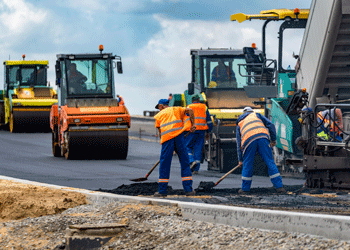 Indian firm wins Dubai Latifa Bint Hamdan road project
Indian firm wins Dubai Latifa Bint Hamdan road project12 February 2026
Register for MEED’s 14-day trial access
Indian contractor Larsen & Toubro (L&T) has won a contract to construct the first phase of the Latifa Bint Hamdan Street development project in Dubai.
The contract value is between $110m and $275m, according to L&T’s contract classification.
This project covers 12.2 kilometres of road network from its intersection with Al-Khail Road to Emirates Road.
The project also includes 8.1km of bridges and will add capacity for about 16,000 vehicles an hour in both directions.
The scope also involves widening the two-lane dual carriageway to four lanes in each direction.
The project is scheduled for completion within 36 months.
The contract was awarded by Dubai’s Roads & Transport Authority (RTA).
The project is part of the RTA’s estimated AED16bn ($4.3bn) 2024-27 Main Roads Development Plan, which includes 22 projects across Dubai’s road network, as announced in November 2024.
The development plan includes the construction of new roads and bridges to alleviate traffic congestion at several key locations across Dubai.
Planning for growth
The Dubai 2040 Urban Master Plan was launched in March 2021. Its launch referenced studies indicating that the emirate’s population will reach 5.8 million by 2040, up from 3.3 million in 2020. The daytime population is set to increase from 4.5 million in 2020 to 7.8 million in 2040.
In December 2022, Sheikh Mohammed Bin Rashid Al-Maktoum, Vice President and Prime Minister of the UAE and Ruler of Dubai, approved the 20-Minute City Policy as part of the second phase of the Dubai 2040 Urban Master Plan.
In addition to the road projects, the RTA’s Dubai Metro Blue Line extension also forms part of Dubai’s plans to improve residents’ quality of life by cutting journey times, as outlined in the policy.
The policy aims to ensure that residents can meet 80% of their daily needs within a 20-minute walk or bike ride. This goal will be achieved by developing integrated service centres with the necessary facilities and by increasing population density around mass transit stations.
https://image.digitalinsightresearch.in/uploads/NewsArticle/15635237/main.gif -
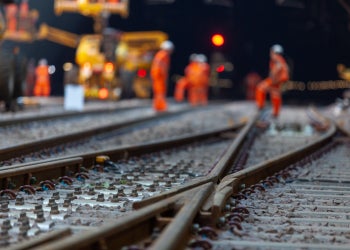 SAR tenders Riyadh section of Saudi Landbridge
SAR tenders Riyadh section of Saudi Landbridge12 February 2026

Saudi Arabia Railways (SAR) has tendered a design-and-build contract for the construction of a new railway line, the Riyadh Rail Link, which will run from north to south Riyadh.
The tender was issued on 29 January, with a bid submission deadline of 29 March.
The scope of work includes constructing a 35-kilometre-long double-track railway line connecting SAR’s North-South Railway to the Eastern Railway network.
The contract also covers the procurement, construction and installation of associated infrastructure such as viaducts, civil works, utility installations, signalling systems and other related works.
The project is expected to form a key component of the Saudi Landbridge railway.
Last month, SAR said it would deliver the Saudi Landbridge project through a “new mechanism” by 2034, after failing to reach an agreement with a Chinese consortium for the construction of the project, as MEED reported.
In an interview with local media, SAR CEO Bashar Bin Khalid Al-Malik said the consortium failed to meet local content requirements and that the project will now be delivered in several phases under a different procurement model.
The project has been under negotiation between Saudi Arabia and China-backed investors keen to develop it through a public-private partnership.
Al-Malik said that the project cost is about SR100bn ($26.6bn).
It comprises more than 1,500 kilometres (km) of new track. The core component is a 900km new railway between Riyadh and Jeddah, which will provide direct freight access to the capital from King Abdullah Port on the Red Sea.
Other key sections include upgrading the existing Riyadh-Dammam line, a bypass around the capital called the Riyadh Link, and a link between King Abdullah Port and Yanbu.
The Saudi Landbridge is one of the kingdom’s most anticipated project programmes. Plans to develop it were first announced in 2004, but put on hold in 2010 before being revived a year later. Key stumbling blocks were rights-of-way issues, route alignment and its high cost.
In April last year, MEED exclusively reported that SAR had issued a tender for the lead design consultancy services contract on the Saudi Landbridge railway network.
MEED understands that the scope covered the concept design and options for the preliminary and issued-for-construction design stages on the network.
MEED reported that the launch of a design tender directly by SAR suggested that Riyadh was looking at other options to develop it alongside the Chinese proposal.
In December 2023, MEED reported that a team of US-based Hill International, Italy’s Italferr and Spain’s Sener had been awarded the contract to provide project management services for the programme.
If it proceeds, the Saudi Landbridge will be one of the largest railway projects ever undertaken in the Middle East and one of the biggest globally. Based on typical design timeframes, tenders for construction are likely to be ready by mid-2026, although the question of how it will be financed will need to be answered before it can proceed to the next step.
https://image.digitalinsightresearch.in/uploads/NewsArticle/15635220/main.jpg -
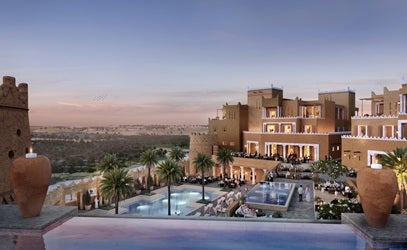 Diriyah allows Montage bidders more time
Diriyah allows Montage bidders more time12 February 2026
Saudi gigaproject developer Diriyah Company has extended the bid deadline to 14 February for a contract to build a Montage hotel and branded residences within its Wadi Safar masterplan in the Diriyah development.
The project comprises a 200-key hotel and 30 branded residences.
The tender was issued in December last year.
Dubai-based SSH is the lead designer and the supervision consultant.
UK-headquartered Turner & Townsend is the project management consultant.
Wadi Safar is one of the original projects announced by Diriyah Company as part of the Diriyah project.
It is a mixed-use development featuring residential buildings, farm plots, hotels, branded hotel villas, a golf course, an equestrian and polo club, and other leisure and entertainment facilities.
The main construction works on some of the other assets in Wadi Safar are under way.
In July last year, MEED exclusively reported that Diriyah Company had awarded an estimated SR8bn ($2bn) contract to construct assets in the Wadi Safar development to a joint venture of local firm Albawani and Qatari contractor Urbacon Trading & Contracting.
The joint venture is developing the following assets:
- The Aman Wadi Safar hotel and residences
- A Six Senses hotel
- A Chedi hotel and residences
- A Faena hotel and residences
- The Royal Diriyah Equestrian & Polo Club (excluding enabling works)
- The North and South Fairways retail facilities and a mosque
- The Grove retail facilities, mosque and clinics
Last year, the company awarded several main construction contracts worth over SR24bn ($6.5bn).
In November, Diriyah Company awarded two construction contracts with a combined value of over SR5.7bn ($1.5bn), as MEED reported.
The contracts were officially announced on the sidelines of the Cityscape Global event in Riyadh on 17 November.
The first contract was awarded to local firm BEC Arabia Contracting Company for the construction of offices in the Media and Innovation District of Diriyah.
MEED understands that the contract is valued at about $800m.
This project will deliver office spaces for media companies and creative agencies.
Within the same district, BEC Arabia will also build residential assets on the Manazel Al-Hadawi plots.
The other contract, estimated to be worth $900m, was awarded for the main construction works on King Khalid Road.
The deal was signed with another local firm, Almabani General Contractors.
The project involves constructing three interchanges connecting King Khalid Road with the northern and western ring roads.
The Diriyah masterplan envisages the city as a cultural and lifestyle tourism destination. Located northwest of Riyadh’s city centre, it will cover 14 square kilometres and combine 300 years of history, culture and heritage with hospitality facilities.
https://image.digitalinsightresearch.in/uploads/NewsArticle/15635172/main.jpg
Top Trending Articles
- Top pending projects in 2024
- Neom hydrogen project reaches 60% completion rate
- Abu Dhabi to tender Project Wave phase two in 2024
- Masdar completes Terna Energy acquisition
- Samsung C&T to undertake Amiral cogen EPC
- Top 10 GCC contractors by country
- Gigaproject seeks firms for Riyadh rail link
- Joint venture selected for Oxagon port work
Exclusive from Meed
-
 Solar deals signal Saudi Arabia’s energy ambitions
Solar deals signal Saudi Arabia’s energy ambitions13 February 2026
-
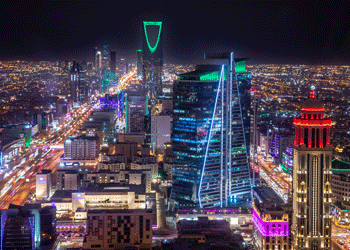 Saudi Arabia appoints new investment minister
Saudi Arabia appoints new investment minister13 February 2026
-
 Indian firm wins major Oman substation contract
Indian firm wins major Oman substation contract12 February 2026
-
 Developers appoint contractor for $500m wastewater treatment project
Developers appoint contractor for $500m wastewater treatment project12 February 2026
-
 Dewa raises Empower stake in $1.41bn deal
Dewa raises Empower stake in $1.41bn deal12 February 2026
All of this is only 1% of what MEED.com has to offer
Subscribe now and unlock all the 153,671 articles on MEED.com

-
Digital Subscription
$175/monthPaid Annually
-
MEED.com
Unlimited access to 20 year archive on desktop and mobile
-
Video Content
All the latest news and analysis in a convenient video format
-
Daily/Weekly Newsletters
Receive your choice of sector and country newsletters at your preferred frequency
-
MEED.com
-
Premium Subscription
$291/monthPaid Annually
-
MEED.com
Unlimited access to 20 year archive on desktop and mobile
-
Video Content
All the latest news and analysis in a convenient video format
-
Daily/Weekly Newsletters
Receive your choice of sector and country newsletters at your preferred frequency
-
MEED Premium Datasets
Access five interactive datasets and conduct your own research into market trends, deals and companies
-
MEED Bussiness Review Magazine
Get our unique, forward looking commentary and analysis delivered to your desktop
-
Regular Subscriber Briefings
Network with industry leaders and fellow colleagues in an informal setting
-
Account Manager/Training
A dedicated account manager for all your requests and enquiries to make the most the platform
-
MEED.com


.gif)